Vic Godard - Interview
by Mark Rowland
published: 23 / 11 / 2007
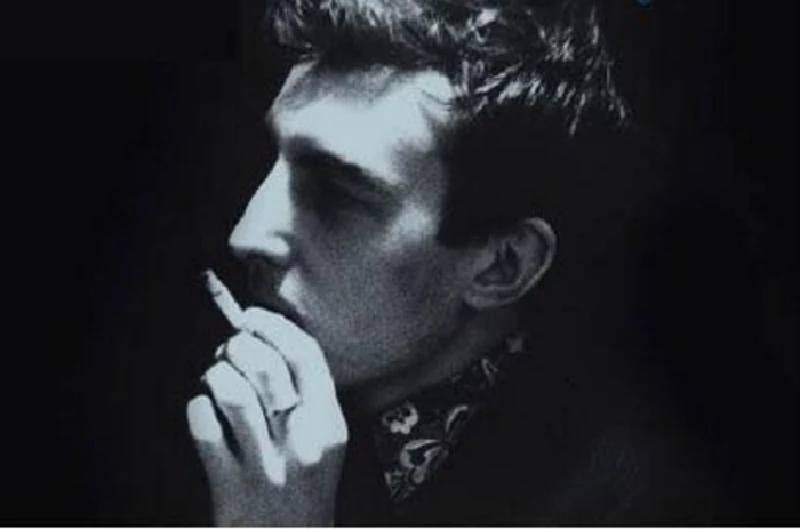
intro
Influential punk band Vic Godard and the Subway Sect's debut album was inexplicably pulled by manager Bernie Rhodes and never released. Now Vic has re-recorded it with the band's present incarnation under the title of '1978 Now'. He speaks to Mark Rowland about his decision to go back to the past
It’s fast approaching seven thirty in the back room of the Amersham Arms in New Cross, and the girl promoting tonight’s gig is getting very anxious. The bands on tonight’s bill were set to sound check between four and six in the afternoon, with the doors set to open at seven. The problem is, while support acts Leaf and Nasty McQuaid had turned up on time, there is still no sign of headlining act, Vic Godard and Subway Sect. This is also particularly worrying for me, as I was supposed to be interviewing Vic at seven. The likelihood that the interview would be postponed is increasing by the second. Suddenly, the doors at the side of the venue opens and in come a bunch of people who look like they could be the Subway Sect. The big clue is that they are all carrying instruments. Among them is a slight, middle-aged man with large glasses, thinning hair in short, tight curls and a beige corded jacket. He doesn’t look like a key player in the UK punk movement, more like a librarian, but he is in fact Vic Godard. It turns out that the band were coming from different areas from London (one from Brighton) and all got stuck in traffic. I introduce myself to Vic and tell him that as he’s running late and still has to sound check, I don’t mind if he wanted to postpone the interview. “Don’t worry about that,” he says in a nasal London drawl. “Our drummer’s not here yet.” We almost head out to find a café until we realise that the Amersham Arms serves tea. The barman quicky brings it over, along with a jug of milk and a small bowl with four or five sugar cubes in it. “Can I have some more sugar please?” Godard asks the barman before he walks away. He gets another bowl of sugar. As he asks me about Pennyblackmusic, Godard continues to put sugar into his tea, lump by lump. By the time he’s finished, I’m convinced that he’s put at least 15 in there. “I’ve got to have tea,” he explains with a smile. “It’s being a postman. It’s the only thing that gets you going in the morning.” It is surprising, but being a postman is one of the things Vic Godard is known for. In 1986, he decided to quit music and has been a postman ever since. Before then, he was the front man of the Subway Sect: one of the most original bands to form at the beginning of the UK punk movement. A band of some maturity and sophistication despite rudimentary musical skills, they were one of the first bands that would eventually be labelled post-punk, mixing more influences and ideas than the standard punk ’three chords and anarchy’. Over the years, their sound moved on to incorporate, soul, jazz and in recent years, dub, but for a long time their earliest material had never really made it onto record. The Subway Sect recorded what was meant to be their debut album in 1978 and were set to release it through Braik records, the label run by their then manager, Bernie Rhodes, who was also managing the Clash. The album never saw the light of day. Rhodes sat on the album for some time, eventually releasing ’Ambition’ as a single, but not before speeding it up and adding a synth part to it. He then sacked all of the band apart from Godard, who he kept on as a songwriter for the label's other bands (though nothing ever came to light). The Subway Sect reformed with new members in 1980, and some of the material that would have made up their debut appeared on the album ’What’s the Matter Boy?’, but they were all but unrecognisable as their original incarnations. Now however, those songs have been re-recorded in their original arrangements by Godard and the present incarnation of the Subway Sect and have been released as ’1978 Now’. What is striking about the album is its timeless sound; as if it could have been recorded in the present day or back in 1978. After so many years trying out differing musical styles and arrangements, it seems that Godard has finally come full circle. PB : The songs on ‘1978 Now’ were supposed to make up your debut album back in 1978, but never saw the light of day. Why did you decide to re-record them now ? VG : My manager wanted to put out an album of all the stuff that had already been out, and I really resisted that. I had this old rehearsal tape from ‘78 and I really wanted to do something with those songs, and the easiest way to do that was to go and do them again. I thought it would be a lot easier than it was until I started it. When Mark Laff came in who used to drum with us at the time, the whole thing became slightly more difficult, because he was living in Brighton and the rest of us were in London, so it took a lot longer than expected really. PB : What are the differences between the old and new recordings ? VG : The difference is just the drumming. The drumming on this stuff is totally different. On the original versions the drumming was really busy, it filled every available space, whereas on this album Mark has taken up a totally different style, a quite minimal style. That’s the big difference that I here, but I like both the different versions. PB : Your then manager Bernie Rhodes sat on the original recordings for some time. Why do you think he didn’t release them ? VG : I think it was basically because he was so busy managing the Clash. He sort of farmed us out to various people who worked for him to take care of us on tours, but, when it came to making records, I think we probably asked for too much money from the record label. PB : I know that Rhodes sped up your recording of ‘Ambition’ and added synth to it. Do you think he may have been dissatisfied with the recordings ? VG : Yeah, he probably didn’t think that we were good enough to release it. PB : With hindsight, do you think it was a good idea for you to work with Rhodes ? VG : It was a big mistake really. We could’ve done a lot better without him, definitely. We’d probably have been able to make a record and put out another record. That said, he did get us onto tours that we might not have got on without him. PB : He fired all the band members apart from you, how did you feel about that at the time ? VG : Yeah, it was very strange. PB : Was it difficult for you to get rid of them ? VG : It was easy, because they were useless. If they’d have been quite good it would have been harder (Laughs). PB : After a period of time working on your own, a new Subway Sect was formed. Why was that ? VG : Bernie did that. It wasn’t anything to do with me. He told me he just wanted me to be a songwriter for other people and not release albums, but then he must’ve changed his mind for ’What’s the Matter Boy?’ I know for a fact that he must’ve got that studio free, because this bloke had only just built the studio and all the guitar on the album is actually the bloke who built the studio. It’s not me, though it was credited as me. What happened was that after I’d gone they played back the music it turned out that all of the guitar was slightly out of tune so the bloke who built the studio re-did it there without telling me. PB : Did that bother you at all ? VG : No I never liked the album that much anyway, so I wasn’t that bothered to be honest. But a lot of people thought it was really good and it was reissued twice, so it was only after some time had passed that I felt it would probably have been better if it was my guitar on it. It would have put a slightly different perspective on it. PB : Why didn’t you like the album ? VG : I just didn’t like the production on it. I didn’t like the sound of it. PB : You’ve attempted many musical styles over the years, from punk to northern soul to jazz and dub… VG : We also did kind of a George Formby thing, with a ukulele and that. PB : I haven’t heard that stuff. VG : Some of it’s on our MySpace site, ’Blackpool’ and ’Handjobs’. They’re off the ’Blackpool’ album. PB : How do you decide on the musical direction you are taking, and are there any styles you’d like to try in the future ? VG : When a song comes to me, normally the style is there with it when it comes into me head. It’s already in that style. PB : Your albums are usually in a consistent style. Do you find once you start writing in one style, you don’t stop until you have an album from it ? VG : I don’t really plan things at all really, I just do as much stuff as I can and hope that as much of it comes out, but a lot of my songs never come out. A very small proportion of songs that I write actually see the light of day. They’re just on cassettes and things. I would like to release some of the live tapes that I’ve got. I’ve got about 20 or 30 recording of gigs that we’ve done. It would be good to put out something like the best of the live stuff. PB : Do you have a preference for recording or playing live ? VG : I really like doing both. What I’d love to be able to do is to sing on a record the way I do when I perform live. I find it really difficult to sing when I’m recording in the same way as it’s done when it’s live. I don’t know why. I seem to spend a long time trying to recreate something that when I’m doing a gig happens instantly anyway. That’s why recording is such a slow thing because you’re trying to capture exactly what it would sound like if it was played live on the record. PB : What kind of set up do you have in a studio ? Do you record together as a band or layer up each part ? VG : It varies. With '1978 Now' we did it all together. We were all set up in one room, apart from the drummer, who was in a sort of little thing that looked like a bid watcher’s hide, with bits of board sort of piled up around him. All the rest of us were in the one room, so we had to record the bass and drums, then do the guitars, then finally do the singing. PB : How much do you think the studio set up influences the way you sing on record ? VG : It shouldn’t be an issue. The place we were using wasn’t even a proper studio anyway. It was like in a charity place. They’d only just got the equipment together. It was very improvised the equipment they had. I imagine there are studios about that know how to get that live sound straight away, but they are a probably bit out of our price range though. PB : Although highly acclaimed and influential, Subway Sect didn’t get as famous as other bands of the era. Where you commercially driven at the time ? VG : Yeah, we were always selling albums and t-shirts and things, but on a slightly smaller scale. I don’t really like doing big festivals and things, though. I’m not really into that. The stuff that we’re doing at the moment, the punk stuff, needs to be played in venues like this for it to work. It’s difficult playing with Edwyn Collins in a theatre with everyone sitting down which we did last weekend. It’s the wrong sort of music for that really. PB : How do you think your life would have changed if the Subway Sect had reached the same level of popularity as the Clash or the Sex Pistols ? VG : I haven’t got a clue. I don’t really think about things like that. PB : It’s just interesting to wonder whether you would’ve tried as many things creatively if you had become famous. VG : I doubt it, We would probably have done what all the bands that got successful in that era did and just sort of stuck to the same thing, like the Ramones. If you get successful doing one thing, it must be really difficult to do something different. I’m always trying to do something a bit different anyway. It's part of my nature. In order to get that kind of success they had to work closely with big record labels, which I’ve never been able to do. PB : You’d never have been able to become a postman either. VG : Yeah, it’d be a big loss to the Mail industry. PB : Why did you decide to quit music and get a day job in the first place ? VG : It was probably when I split from Bernie Rhodes. I was fed up with the whole thing. I suppose if I’d got an offer from another manager or some record company I probably would’ve done that instead of becoming a postman. PB : You’ve been a postman for some time now… VG : It’s definitely been a lot more productive than the period before that, anyway. PB : How difficult is it to balance your work and your music ? VG : It’s really difficult doing these gigs and stuff. It’s really hard to get time off. Also it’s not just me who’s a postman. Our bass player’s a postman as well, although he won’t be for much longer. He’s doing the Knowledge so he can become a black cabbie. So then, we’re going to try to set up a tour of Italy in February, because then when he’s a cabbie he’ll be his own boss. He’ll be able to take time off when he likes. PB : How difficult is it for you to get time off ? VG : It’s really difficult to get time off. They have to know about it about a year in advance as well. You can pay somebody to do the job for you, but that gets expensive. You can do that for a couple of days, but if you do it for longer than that it can cause problems. PB : How are you ensuring that you have the time to play the dates in Italy ? VG : We haven’t come to that yet. We’ve got Bristol and Northampton to worry about before then. PB : Does your job make it difficult for you to play during the week, especially in other parts of the country ? VG : No we’ve just been up to Scotland. If we want to do like a mid-week gig, we try to make sure it’s within a hundred miles from London. PB : It must be quite tiring doing that when you have to work such early hours. VG : If we do gigs in places like Bath and Bristol we do have to drive straight back. Not long ago, I’d arranged a gig not that far away, somewhere like Leicester or Bristol. It might have been Cardiff. I had the day off the next day, but Trigger (Subway Sect bassist) didn’t. He spent the whole time worrying about what time he’d get back and he’d estimated that he’d probably get in at about half three and he needed to be at work at five. He actually got in at ten to five. He literally had to get his uniform on and go straight out the door. Thing is, you can pretty much do it on automatic. That’s quite a good thing about being a postman, You can do it in a robotic state. PB : How helpful is that for your song writing? VG : It’s really good. I don’t write any songs while I’m delivering though cause I don’t have anything with me to record on. It’s good to be doing something out in the open where you don’t have to use your brain. It’s a really big help, to be able to clear your mind of certain things and concentrate on certain thoughts. The exercise is good as well and the bike riding is good. PB : After a fairly successful solo career, why did you decide to resurrect the Subway Sect at the end of the nineties? VG : We wanted to do an album, me and Nick Brown, the guy that did ‘Sansend‘. We wanted to do an album with various different singers and we decided to go under the name Subway Sect and under that we can put anyone we want on the vocals, you know. But I’d already been using the name live when I was working with the Bitter Springs. This band the Bitter Springs would do gigs as the Bitter Springs, but they also worked as my backing band and then they’d call themselves the Subway Sect. PB : Do you still work with the Bitter Springs? VG : Yeah, they did a gig last night, in an astrophysical laboratory in Teddington. PB : Now that you have two potential Subway Sects, where do you go once you’ve finished promoting this album? VG : Well at the moment I’m getting ready to re-issue Songs For Sale (Godard's jazz-influenced 1982 second album), so I’m trying to get a band together for that, try to get some of the original members of that, do a bit more jazzy stuff, not as a regular thing, because I’ll still be doing this punk stuff, but I’d like to do a few gigs when ‘Songs For Sale’ comes out. PB : How important is it for you to get the original players from ‘Songs For Sale’ back together ? VG : It’s important because if I don’t get them, I’d have to get proper jazz men and pay them. That’s why I need the original members, cause they’re the only ones that I can get for nothing (laughs). Not for nothing, for a share in what we make. Jazz men want a set rate, like for rehearsals they want like a hundred and something day and for the gig that’s another hundred a day. It’s a bit much. PB : Why did you decide to get some of the original members back for ‘1978 Now’ ? VG : I just wanted to get the songs out. I listened to the songs on the cassette and I thought, that’s a really good album. So the most important thing was to get the songs sounding as they did then. Bob Ward was the original drummer and I’ve lost contact with him altogether so I couldn’t get him. I contacted the original guitarist and asked him if he was interested, but he didn’t want to do it. The bass player did a few songs, but then he didn’t have enough time to do the rest of it, so I decided to do the album with the band I was playing with live, apart from when Mark Laff came in on the drums. He came to see us live and really liked it. That’s when I asked him if he was interested in doing the drums on the record. I sent him a tape of it and he liked it. He didn’t remember the songs as the one’s he used to drum on, but he just liked the sound of it. PB : It does sound like it could have been recorded then or now. VG : That’s what’s good about it. It hasn’t dated as much as some of the other punk stuff from that time, which is very obviously of that time, whereas some of the stuff on there could easily be done now, like you say. That’s what’s the best thing about it. PB : Why do you think the Subway Sect stuff hasn’t dated as much ? VG : I think it’s because even at the time it sort of stood apart from a lot of the other punk stuff that was about at the time. When we were doing it live in 1978 I don’t think it sounded like a lot of the stuff. A lot of the punk bands had a bit of an identikit sound, didn’t they ? But we just didn’t sound like that. So when you listen back to the punk stuff about then it sounds a bit hackneyed, but because we never sounded like that in the first place it’s probably why it stands up better. PB : When you started, none of you could really play. What sort of stuff influenced you at the time ? VG : We really liked the Velvet Underground oand the Seeds, people that didn’t use many chords. They were all like American groups, the Thirteenth Floor Elevators, or more modern groups like the Talking Heads or Television. Richard Hell was who we wanted to write songs like. PB : It’s strange how a band with limited technical ability can take a bunch of influences and create something completely different. It certainly doesn’t sound anything like Thirteenth Floor Elevators. VG : The thing is, if we’d have just gone along listening to all that stuff, we wouldn’t have done anything. It was seeing the Sex Pistols, going to their gigs, that made you realise that you could do it yourself. Their influence was that you realised you didn’t have to be like those American sounds; you did your own thing. When I was trying to sing I always thought I was trying to sound like Jonathan Richman in those early days. Not that I did, but that’s who I thought I was trying to sound like. PB : You were asked by Malcolm McLaren to play at the 100 Club before you’d really become a band. How did you feel after you’d agreed to do it ? VG : I just thought that we needed songs, because we only had like about two riffs, but we needed about four songs as a bare minimum. We’d already been playing about as a band but we weren’t doing songs of our own. We were trying to do like Chuck Berry songs and all that, but without a drum kit, we’d just use a waste paper basket. We’d try to do things like ’Sister Ray’ using a tape recorder and one of those little microphones feeding back to create a drone, that sort of thing is what we did. But you couldn’t really do that live. So we actually came to Lewisham to get our first drum kit before we even had a drummer. We just thought that we’d need a drum kit if we were going to be a band. So we got this drum kit for about 85 quid on hire purchase for which all four of us just paid a bit every week. That really started the group off, even though we didn’t have a drummer, because the bloke who was our singer at the time told us that he had drummed in the boy scouts, so he became the drummer. He wasn’t a drummer really at all. He did about seven gigs then he realised he didn’t want to be a drummer. Then we got our first proper drummer. He actually got us through the gigs alright though. He just didn’t have any intention to be a drummer. He joined us as the singer. PB : How do you think your waste paper basket days influenced the way you approached your songs ? VG : I think it makes you want a really rough sound than a smooth sound generally, a more jagged sound. I always tend to prefer the early versions of songs to the finished thing. PB : Perhaps it’s because the music is being carried by a band’s energy and creativity rather than its musical ability. VG : Yeah. I’ve never really been into being a musician, but I like playing music. I like messing with drum machine and things like that. I don’t consider myself a musician, but I like to create things. It’s finding enough time to do a lot. I’ve always got a tape recorder within reach though, so I can record my ideas. PB : What do you think of this sterilised resurgence of punk and poat-punk in the past few years ? VG : I don’t know enough about it, I didn’t know there was a resurgence. PB : Like Franz Ferdinand, etc. Lots of Subway Sect style trebly guitars. VG -: You’d have to talk to my band about that. They’d know more about it than me. Not Mark Laff, but the younger ones. They’re the ones that tell me all about that sort of thing. PB : Do you not pay that much attention to what’s happening in music now? VG : Yeah I do, but not that sort of music. I listen to the hip hop stuff. PB : What kind of hip hop do you like ? VG : I like that Southern stuff, that slowed down stuff. Have you heard that ? PB : Not sure. Do you know any names of the artists ? VG : All different artists, but the DJs slow the music right down. That’s what I really like. I like all kinds of hip hop but at the moment. It’s going through a really bad time. PB : There are some good hip hop labels and artists, but commercially it has become formulaic. What do you think of artists such as 50 Cent ? VG : I can’t listen to that sort of stuff. It’s terrible, isn‘t it ? PB : Would you ever do an overtly hip hop influenced album? You touched on it on ‘Sansend.’ VG : That album took too long to make, like a sideline project. At the end of it I was really pleased it was finished. It took so long. It was quite painstaking putting all the elements together. I’d quite like to work with a DJ live. I would not necessarily play live, but get in a room with him and do the stuff live, just tape bits of it and see what good stuff came out of it. ’Sansend’ didn’t work like that. It was all pieced together bit by bit. But saying that, it came off like two different break beat albums looped on the album. Apart from like, two or three tracks, they all used samples off the same two albums, like out of the sixteen tracks we used seven off one album and another four off another album. When you do that, though, you don’t have a lot of freedom. You’re sort of dictated where to go. PB : So you would like to work with a live hip hop band, like a DJ with a drummer and bassist, or something like that ? VG : Yeah, that would be great. PB : Thank you.
Picture Gallery:-
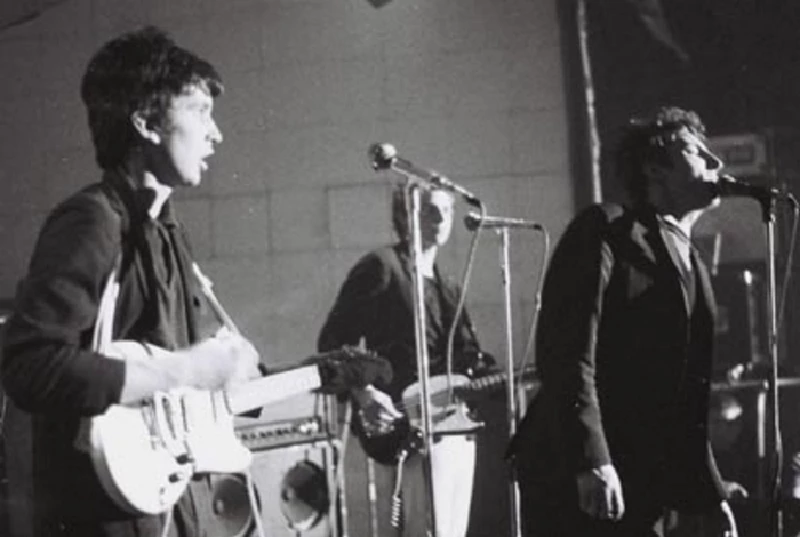
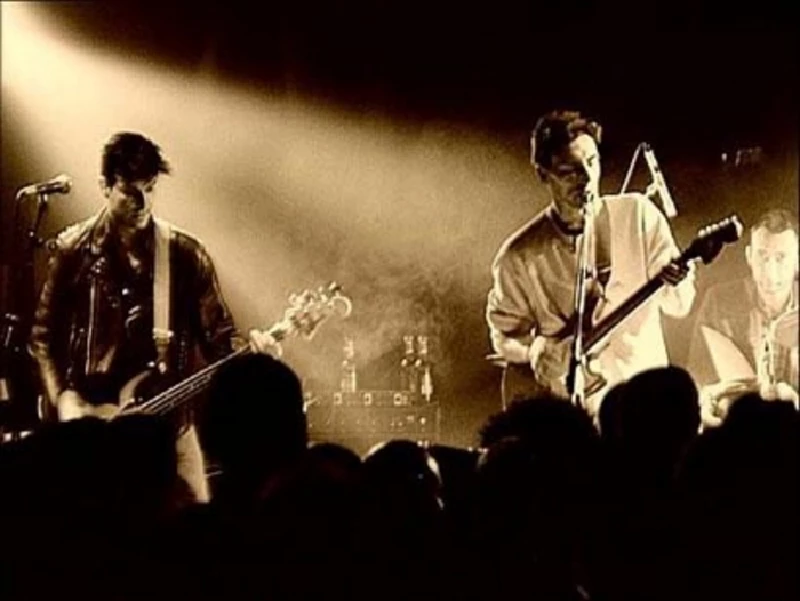
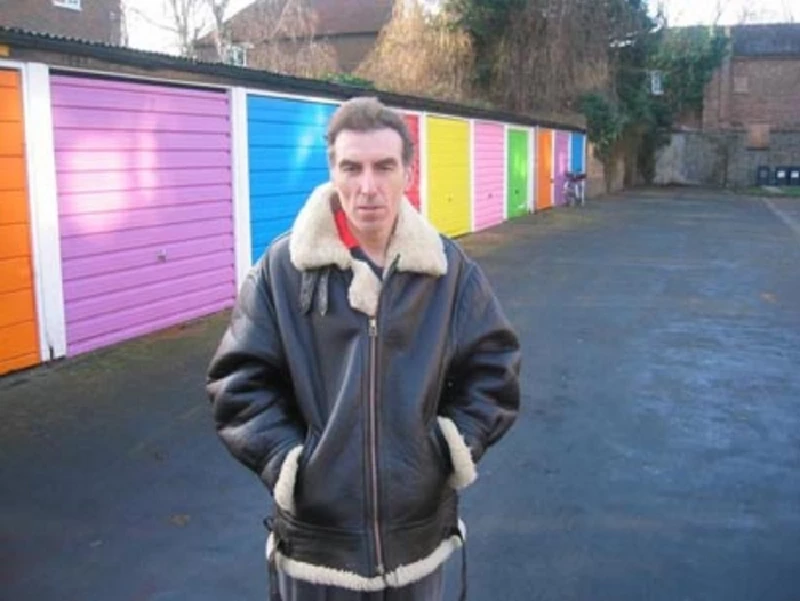
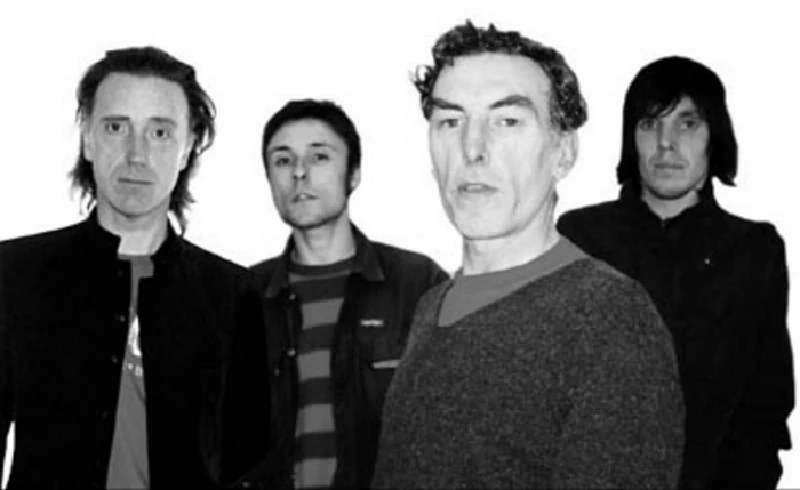
most viewed articles
current edition
Peter Doherty - Blackheath Halls, Blackheath and Palace Halls, Watford, 18/3/2025 and 21/3/2025Armory Show - Interview with Richard Jobson
Liz Mitchell - Interview
Lauren Mayberry - Photoscapes
Deb Googe and Cara Tivey - Interview
Max Bianco and the BlueHearts - Troubadour, London, 29/3/2025
Maarten Schiethart - Vinyl Stories
Sukie Smith - Interview
Clive Langer - Interview
Kim Wilde - Photoscapes
previous editions
Heavenly - P.U.N.K. Girl EPBoomtown Rats - Ten Songs That Made Me Love....
Trudie Myerscough-Harris - Interview
Doris Brendel - Interview
Beautiful South - Ten Songs That Made Me Love...
Kay Russell - Interview with Kay Russell
Dwina Gibb - Interview
Pulp - Ten Songs That Made Me Love...
Sound - Interview with Bi Marshall Part 1
Jay Reatard - Interview
most viewed reviews
current edition
Davey Woodward - Mumbo in the JumboNigel Stonier - Wolf Notes
Wings - Venus and Mars
Only Child - Holy Ghosts
Kate Daisy Grant and Nick Pynn - Songs For The Trees
Neil Campbell - The Turnaround
Philip Jeays - Victoria
Darkness - Dreams On Toast
Suzanne Vega - Flying With Angels
Charles Ellsworth - Cosmic Cannon Fodder
Pennyblackmusic Regular Contributors
Adrian Janes
Amanda J. Window
Andrew Twambley
Anthony Dhanendran
Benjamin Howarth
Cila Warncke
Daniel Cressey
Darren Aston
Dastardly
Dave Goodwin
Denzil Watson
Dominic B. Simpson
Eoghan Lyng
Fiona Hutchings
Harry Sherriff
Helen Tipping
Jamie Rowland
John Clarkson
Julie Cruickshank
Kimberly Bright
Lisa Torem
Maarten Schiethart